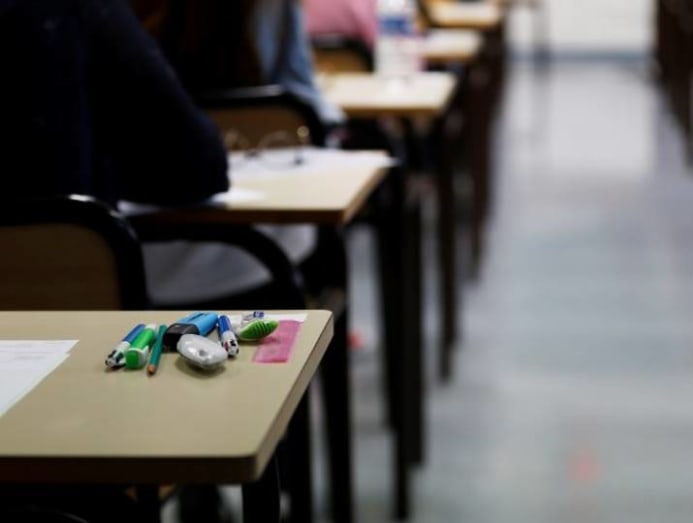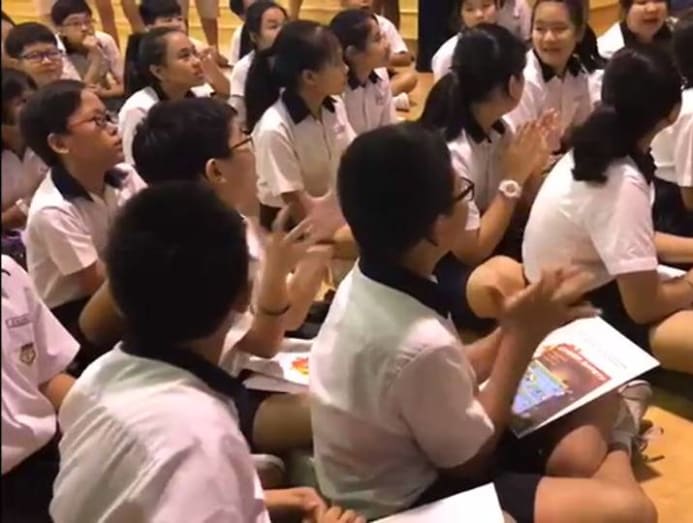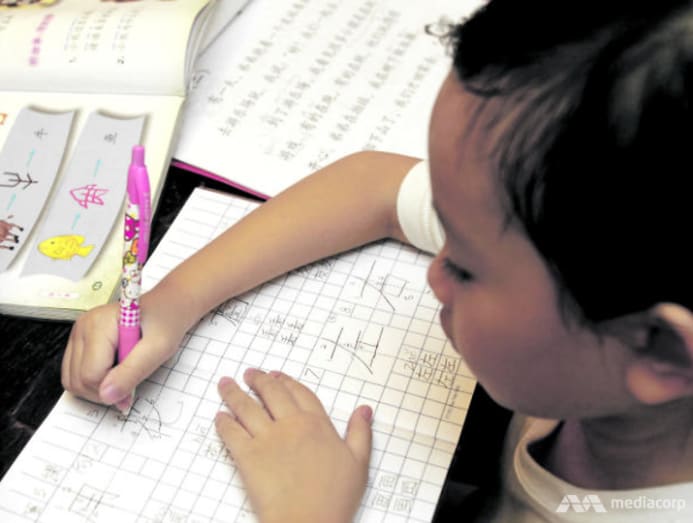Commentary: These PSLE changes won’t fix our national obsession with academic achievement
SINGAPORE: A few days ago, Minister for Education Ong Ye Kung said that the new Primary School Leaving Test (PSLE) scoring model might non be the silver bullet to de-emphasise grades, but was office of a "significant reform" of the entire pedagogy system that would reach this goal.
He was speaking in response to parental concerns that this new scoring model did non appear to bring meaning changes as students would still be sorted and differentiated according to their test results.
Is the instruction organisation evolving fast enough in gild to improve equip our students for the future?
SWEEPING REFORMS INTRODUCED OVER THE YEARS
The Ministry of Education has introduced a series of reforms to the pedagogy organization over the by two decades with the intention of de-emphasising the primacy of bookish grades and placing more emphasis on other goals such every bit character development, the development of 21st century competencies, fostering the joy of learning and encouraging lifelong learning.
READ: What we gain and lose in moving away from streaming, a commentary
For instance, diverse integrated programmes were introduced in 2004 for elevation-performing secondary school students to gratuitous them from the pressure of preparing for the high-stakes General Certificate of Education Ordinary-Level examinations.
The idea was that these students would and then be ameliorate able to develop other non-bookish attributes such as creativity and leadership.
That same year, the Direct School Admission scheme was introduced to accord priority to non-academic talents during admission exercises for secondary schools and inferior colleges, and subsequently, polytechnics too.
In add-on, in 2022 the Ministry of Education stopped announcing the names of top PSLE scorers and banding secondary schools co-ordinate to their bookish results.
More recently, the number of tests and examinations in main and secondary schools has been reduced.
READ: Parents, don't shy away from a competitive pedagogy organisation, a commentary
A NUDGE TO MOVE AWAY FROM Course CONSCIOUSNESS
The aim of this new PSLE scoring model appears to marshal with the broader intent of these other reforms.
Among other objectives, it seeks to narrow the range of PSLE scores and movement away from the current norm-referenced organization where students' scores are calculated with reference to how well their peers have done.

In addition, there volition be a narrower spread of cutting-off access scores for secondary schools in gild to reduce the differentiation amidst secondary schools in terms of these scores.
Furthermore, parents and students are being encouraged to consider a basket of factors, such every bit schoolhouse civilization, co-curricular activities and niche programmes, when selecting a secondary school, instead of basing their choice largely on a school's admission score range.
But how far can these existing and future reforms go in terms of pushing the education system farther in the management of moving abroad from our national obsession with academic grades in the direction of ameliorate preparing students for the future?
REVIEW OUR NATIONAL OBSESSION WITH GRADES
Attitudes, beliefs and behaviours are proving rather hard to dislodge despite virtually two decades of reforms.
For instance, Prime Minister Lee Hsien Loong best-selling in his 2022 National Day Rally speech that many parents still had potent preferences for schools that they perceived to exist strong in terms of academic results.
He best-selling that competition was intensifying and the focus on examination performance had come at the detriment to a focus on learning.
Reflecting this obsession is the fact that the private tutoring industry continues to thrive and morph in directly response to various policy reforms.

READ: What is lost when we spend more on tuition, a commentary
It is clear that many parents even so view education as a positional good, and that different schools and educational pathways offering different chances of "success" in life.
It is natural for parents to view pedagogy policies more in terms of what they hateful for their children's life-chances than the policy implications for macro-level goals such as equity and providing a common space for social mixing.
This tendency therefore lends itself to considerable feet over a host of bug such as admission criteria, assessment load, and greater permeability across diverse educational pathways.
The reality is that the education system is still very much a mechanism for sorting students into unlike schools and bands.
In that location is nothing intrinsically wrong with this if one holds the belief that students have different talents and that schools ought to best cater to these differences and nurture students to their fullest potential.
READ: A hyper-competitive civilization is breeding severe test feet among many students, a commentary

Some other reality parents must also come to terms with is that it is impossible and undesirable to look identical educational outcomes for every student.
The active strategising by some parents to assistance their children gain a competitive edge in school and secure the all-time possible academic outcomes stands at odds with other policy objectives such every bit fostering the joy of learning, promoting greater inclusivity and social mixing in schools, and inculcating 21st century competencies so as to better gear up students for the workplace and for life in general.
The Ministry of Teaching has already tried reforms to curricula, assessment, admission systems and permeability of educational pathways.
What more might demand to be done in order to truly motility towards de-emphasising grades?
THE VALUE OF ACADEMIC ACHIEVEMENT
Many parents take seen in their own lives and in the lives of others the importance of bookish achievement in securing access to college incomes and more prestigious jobs.
Information technology is probably impossible to expect any overnight changes in this way of thinking, especially when hiring practices continue to accordance neat importance to academic accomplishment.
READ: Here's what Singapore's human capital index in a earth of disruption should await like, a commentary
At the aforementioned time, it is obvious that many height figures in politics, business and other professions are drawn from the ranks of those who have excelled in schoolhouse.
In addition, academic grades accept for far besides long been commonly viewed every bit the prime or even sole criterion of individual "merit" in the context of the national meritocratic ideal.

READ: Is academic competition really necessary to be the all-time than we can be? A commentary
Previous efforts to requite more weight to other forms of merit in the education system have not been entirely successful.
For instance, the Directly School Admission scheme led to some parents helping their child to develop stellar individual portfolios in non-academic talents, testify that the scheme is fuelling an increase in the admission stakes for prestigious secondary schools, without any let-up in the pressure level to succeed academically.
This side-effect led the Ministry of Education recently to revise the scheme to downplay the impact of portfolios during admission interviews.
There are arguments in favour of keeping academic grades as a cardinal criterion of merit on the grounds that this is fairer to all students every bit they are judged on their performance in key national examinations and can demonstrate their difficult work and individual effort.
Another argument is that de-emphasising grades will devalue the importance of doing well academically.
READ: Bit PSLE? The Singapore education organisation is not a complimentary lunch, a commentary

But then once again, it has become increasingly articulate that academic performance is to some extent dependent on home-based factors such as parental support.
Singapore continues to wrestle with the effect of how best to determine merit and success within an didactics system characterised by competitive examinations that function as sorting and gate-keeping mechanisms.
The path towards the goal of de-emphasising grades will likely go on to exist a tedious one.
Jason Tan is acquaintance professor at the National Found of Didactics.
blaylockneloseling.blogspot.com
Source: https://cnalifestyle.channelnewsasia.com/commentary/commentary-these-psle-changes-wont-fix-our-national-obsession-academic-achievement-290756
Post a Comment for "Commentary: These PSLE changes won’t fix our national obsession with academic achievement"